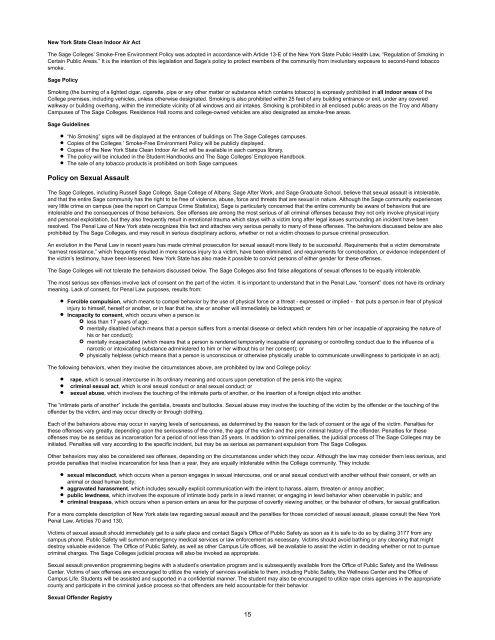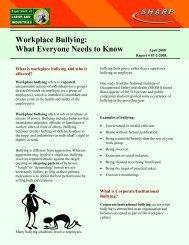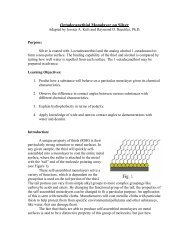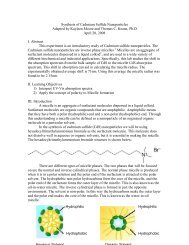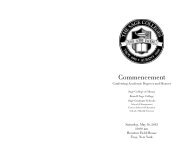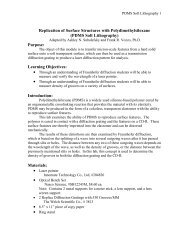Individuals possessing illegal drugs or any drug parphernalia, using illegal drugs or present where illegal drugs are being used will be subject to confiscationand review by the appropriate college administrator.<strong>The</strong> odor of marijuana in student rooms, corridors, lounges, or public areas is sufficient evidence to warrant investigation by a staff member and imposition ofsanctions.Any student judged guilty of illegal drug use on College property will be subject to immediate disciplinary action, which may involve suspension or dismissal. This actionwill be taken independently of any action that might be taken by municipal, state, or federal agencies.Disciplinary Sanctions<strong>The</strong> <strong>Sage</strong> <strong>Colleges</strong> will impose disciplinary sanctions on students and employees who violate the aforementioned standards of conduct. Among the sanctions whichmay be imposed on students are: warning, fine, parental notification, mandated alcohol/drug assessment, alcohol education, probation, community service,suspension, expulsion, or referral for prosecution. Among the sanctions which may be imposed on employees are: verbal warning, written reprimand, suspension withor without pay, termination or referral for prosecution.Health RisksStudents and employees should be aware of the health risks associated with the use and abuse of alcohol and illicit drugs. Alcohol consumption causes a number ofmarked changes in behavior. Even low doses significantly impair the judgment and coordination required to drive a car safely, increasing the likelihood that the driverwill be involved in an accident. Moderate doses of alcohol also increase the incidence of a variety of aggressive acts, including domestic violence, child abuse, andrape. Moderate to high doses of alcohol cause marked impairments in higher mental functions, severely altering a person’s ability to learn and remember information.Very high doses cause respiratory depression and death. If combined with other depressants to the central nervous system, much lower doses of alcohol will producethe effects described.Repeated use of alcohol can lead to dependence. Sudden cessation of alcohol intake is likely to produce withdrawal symptoms, including severe anxiety, tremors,hallucinations, and convulsions. Alcohol withdrawal can be life-threatening. Long-term consumption of large quantities of alcohol, particularly when combined with poornutrition, can lead to permanent damage of vital organs such as the brain and the liver.Mothers who drink alcohol during pregnancy may give birth to infants with Fetal Alcohol Syndrome. <strong>The</strong>se infants have irreversible physical abnormalities and mentalretardation. In addition, research indicates that children of alcoholic parents are at greater risk than other individuals of developing problems with alcohol.Drugs interfere with the brain’s ability to take in, sort and synthesize information. <strong>The</strong>y distort perception, which can lead users to harm themselves or others. Drug usealso affects sensation and impairs memory. In addition to these general effects, specific health risks including substance dependence and death are associated withparticular categories of controlled substances.Campus & Community Resources for HelpStudents and employees of <strong>The</strong> <strong>Sage</strong> <strong>Colleges</strong> who have concerns about alcohol and/or drugs for themselves or others, can contact any number of resources oncampus and in the community for confidential help.On CampusWellness CenterTroy Campus, Kellas Hall (518) 244-2261Albany Campus, Kahl Campus Center (518) 292-1917<strong>The</strong> <strong>Sage</strong> <strong>Colleges</strong> Alcohol and other Drug Education CoordinatorTroy Wellness Center, Kellas Hall (518) 244-2261Provides assessments and interventions, short-term counseling, referrals, consultations, educational programs, literature, and peer education.All alcohol and/or drug related services are free and strictly confidential.Off CampusEmployee Services (Employee Assistance Program)1-800-252-4555Provides free, confidential, professional assistance to any <strong>Sage</strong> employee and/or family member.Community/Self Help Resources(all numbers in 518 area code)Albany Citizens Council on Alcoholism and Other Chemical 465-5470DependenciesEquinox, Albany 434-6135Hope House, Albany 427-8207St. Peters Addiction & Recovery Center, Albany 458-8888Conifer Park, Troy 274-5143Hudson Mohawk Recovery Center, Troy 272-3918Rensselaer County Substance Abuse Services, Troy 270-2800Alcoholism Council of Schenectady 346-4436Alcoholics Anonymous 489-6779Narcotics Anonymous 435-0215Al-Anon/Adult Children 477-4476Smoke-Free Environment<strong>The</strong> <strong>Sage</strong> <strong>Colleges</strong> are committed to providing a smoke-free environment for students, faculty, staff, administrators and visitors. As of 1997, smoking is not permitted inany building on either campus. Our desire to be an entirely smoke-free environment is consistent with our position as an educational leader in health sciences.14
New York State Clean Indoor Air Act<strong>The</strong> <strong>Sage</strong> <strong>Colleges</strong>’ Smoke-Free Environment Policy was adopted in accordance with Article 13-E of the New York State Public Health Law, “Regulation of Smoking inCertain Public Areas.” It is the intention of this legislation and <strong>Sage</strong>’s policy to protect members of the community from involuntary exposure to second-hand tobaccosmoke.<strong>Sage</strong> PolicySmoking (the burning of a lighted cigar, cigarette, pipe or any other matter or substance which contains tobacco) is expressly prohibited in all indoor areas of theCollege premises, including vehicles, unless otherwise designated. Smoking is also prohibited within 25 feet of any building entrance or exit, under any coveredwalkway or building overhang, within the immediate vicinity of all windows and air intakes. Smoking is prohibited in all enclosed public areas on the Troy and AlbanyCampuses of <strong>The</strong> <strong>Sage</strong> <strong>Colleges</strong>. Residence Hall rooms and college-owned vehicles are also designated as smoke-free areas.<strong>Sage</strong> Guidelines“No Smoking” signs will be displayed at the entrances of buildings on <strong>The</strong> <strong>Sage</strong> <strong>Colleges</strong> campuses.Copies of the <strong>Colleges</strong> ’ Smoke-Free Environment Policy will be publicly displayed.Copies of the New York State Clean Indoor Air Act will be available in each campus library.<strong>The</strong> policy will be included in the Student Handbooks and <strong>The</strong> <strong>Sage</strong> <strong>Colleges</strong>’ Employee Handbook.<strong>The</strong> sale of any tobacco products is prohibited on both <strong>Sage</strong> campuses.Policy on Sexual Assault<strong>The</strong> <strong>Sage</strong> <strong>Colleges</strong>, including Russell <strong>Sage</strong> College, <strong>Sage</strong> College of Albany, <strong>Sage</strong> After Work, and <strong>Sage</strong> Graduate School, believe that sexual assault is intolerable,and that the entire <strong>Sage</strong> community has the right to be free of violence, abuse, force and threats that are sexual in nature. Although the <strong>Sage</strong> community experiencesvery little crime on campus (see the report on Campus Crime Statistics), <strong>Sage</strong> is particularly concerned that the entire community be aware of behaviors that areintolerable and the consequences of those behaviors. Sex offenses are among the most serious of all criminal offenses because they not only involve physical injuryand personal exploitation, but they also frequently result in emotional trauma which stays with a victim long after legal issues surrounding an incident have beenresolved. <strong>The</strong> Penal Law of New York state recognizes this fact and attaches very serious penalty to many of these offenses. <strong>The</strong> behaviors discussed below are alsoprohibited by <strong>The</strong> <strong>Sage</strong> <strong>Colleges</strong>, and may result in serious disciplinary actions, whether or not a victim chooses to pursue criminal prosecution.An evolution in the Penal Law in recent years has made criminal prosecution for sexual assault more likely to be successful. Requirements that a victim demonstrate“earnest resistance,” which frequently resulted in more serious injury to a victim, have been eliminated, and requirements for corroboration, or evidence independent ofthe victim’s testimony, have been lessened. New York State has also made it possible to convict persons of either gender for these offenses.<strong>The</strong> <strong>Sage</strong> <strong>Colleges</strong> will not tolerate the behaviors discussed below. <strong>The</strong> <strong>Sage</strong> <strong>Colleges</strong> also find false allegations of sexual offenses to be equally intolerable.<strong>The</strong> most serious sex offenses involve lack of consent on the part of the victim. It is important to understand that in the Penal Law, “consent” does not have its ordinarymeaning. Lack of consent, for Penal Law purposes, results from:Forcible compulsion, which means to compel behavior by the use of physical force or a threat - expressed or implied - that puts a person in fear of physicalinjury to himself, herself or another, or in fear that he, she or another will immediately be kidnapped; orIncapacity to consent, which occurs when a person is:less than 17 years of age;mentally disabled (which means that a person suffers from a mental disease or defect which renders him or her incapable of appraising the nature ofhis or her conduct);mentally incapacitated (which means that a person is rendered temporarily incapable of appraising or controlling conduct due to the influence of anarcotic or intoxicating substance administered to him or her without his or her consent); orphysically helpless (which means that a person is unconscious or otherwise physically unable to communicate unwillingness to participate in an act).<strong>The</strong> following behaviors, when they involve the circumstances above, are prohibited by law and College policy:rape, which is sexual intercourse in its ordinary meaning and occurs upon penetration of the penis into the vagina;criminal sexual act, which is oral sexual conduct or anal sexual conduct; orsexual abuse, which involves the touching of the intimate parts of another, or the insertion of a foreign object into another.<strong>The</strong> “intimate parts of another” include the genitalia, breasts and buttocks. Sexual abuse may involve the touching of the victim by the offender or the touching of theoffender by the victim, and may occur directly or through clothing.Each of the behaviors above may occur in varying levels of seriousness, as determined by the reason for the lack of consent or the age of the victim. Penalties forthese offenses vary greatly, depending upon the seriousness of the crime, the age of the victim and the prior criminal history of the offender. Penalties for theseoffenses may be as serious as incarceration for a period of not less than 25 years. In addition to criminal penalties, the judicial process of <strong>The</strong> <strong>Sage</strong> <strong>Colleges</strong> may beinitiated. Penalties will vary according to the specific incident, but may be as serious as permanent expulsion from <strong>The</strong> <strong>Sage</strong> <strong>Colleges</strong>.Other behaviors may also be considered sex offenses, depending on the circumstances under which they occur. Although the law may consider them less serious, andprovide penalties that involve incarceration for less than a year, they are equally intolerable within the College community. <strong>The</strong>y include:sexual misconduct, which occurs when a person engages in sexual intercourse, oral or anal sexual conduct with another without their consent, or with ananimal or dead human body;aggravated harassment, which includes sexually explicit communication with the intent to harass, alarm, threaten or annoy another;public lewdness, which involves the exposure of intimate body parts in a lewd manner, or engaging in lewd behavior when observable in public; andcriminal trespass, which occurs when a person enters an area for the purpose of covertly viewing another, or the behavior of others, for sexual gratification.For a more complete description of New York state law regarding sexual assault and the penalties for those convicted of sexual assault, please consult the New YorkPenal Law, Articles 70 and 130.Victims of sexual assault should immediately get to a safe place and contact <strong>Sage</strong>’s Office of Public Safety as soon as it is safe to do so by dialing 3177 from anycampus phone. Public Safety will summon emergency medical services or law enforcement as necessary. Victims should avoid bathing or any cleaning that mightdestroy valuable evidence. <strong>The</strong> Office of Public Safety, as well as other Campus Life offices, will be available to assist the victim in deciding whether or not to pursuecriminal charges. <strong>The</strong> <strong>Sage</strong> <strong>Colleges</strong> judicial process will also be invoked as appropriate.Sexual assault prevention programming begins with a student’s orientation program and is subsequently available from the Office of Public Safety and the WellnessCenter. Victims of sex offenses are encouraged to utilize the variety of services available to them, including Public Safety, the Wellness Center and the Office ofCampus Life. Students will be assisted and supported in a confidential manner. <strong>The</strong> student may also be encouraged to utilize rape crisis agencies in the appropriatecounty and participate in the criminal justice process so that offenders are held accountable for their behavior.Sexual Offender Registry15
- Page 1 and 2: T H EProfessionalConnectionCATALOG
- Page 3 and 4: 2009-2010 CATALOGTABLE OF CONTENTSA
- Page 5 and 6: An Overview of The Sage CollegesThe
- Page 7 and 8: Sage Graduate SchoolAdmission Polic
- Page 9 and 10: TuitionPer Credit HourFull-time and
- Page 11 and 12: FINANCIAL AID SERVICESEligibilityTo
- Page 13 and 14: International StudentsInternational
- Page 18 and 19: The federal Campus Sex Crimes Preve
- Page 20 and 21: Academic requirements must be modif
- Page 22 and 23: 2006 0 0 0 0 02007 4 0 0 4 02005 1
- Page 24 and 25: into mentor groups and meet weekly
- Page 26 and 27: CAMPUS LIFE:Resources & ServicesRes
- Page 28 and 29: The following radio and TV stations
- Page 30 and 31: Academic Technology and LibrariesLi
- Page 32 and 33: COURSEWORKCharacteristics of Gradua
- Page 34 and 35: CREDITTransfer of CreditA maximum o
- Page 36 and 37: B+ = 3.3B = 3.0B- = 2.7C+ = 2.3C =
- Page 38 and 39: Conditions for DismissalThe adminis
- Page 40 and 41: Post-BaccalaureateCertificate in Nu
- Page 42 and 43: graduate courses are taken in the f
- Page 44 and 45: Certificate in Forensic Mental Heal
- Page 46 and 47: Management Certificate ProgramsHuma
- Page 48 and 49: Management Certificate ProgramsMark
- Page 50 and 51: 12 credits in clinical area of spec
- Page 52 and 53: Certificate of Advanced Study and M
- Page 54 and 55: School of Education Attendance Poli
- Page 56 and 57: Assessment and Planning Certificate
- Page 58 and 59: Eligibility for Board Certification
- Page 60 and 61: Choose One Specialization (9 credit
- Page 62 and 63: Master of Science in Childhood Educ
- Page 64 and 65: Master of Science in Childhood/Lite
- Page 66 and 67:
School of Education Attendance Poli
- Page 68 and 69:
Prerequisite Courses (must be taken
- Page 70 and 71:
Master of Science in Community Heal
- Page 72 and 73:
Master of Arts in Community Psychol
- Page 74 and 75:
Master of Arts in Counseling and Co
- Page 76 and 77:
Doctor of Education (Ed.D.) in Educ
- Page 78 and 79:
M.S. Forensic Mental HealthForensic
- Page 80 and 81:
Master of Science in Literacy Educa
- Page 82 and 83:
Electronic PortfolioThe School of E
- Page 84 and 85:
Assessment of writing skillsProgram
- Page 86 and 87:
PrerequisitesCreditsEDU 574 Reading
- Page 88 and 89:
FallSpringEDU 511* Course change 3
- Page 90 and 91:
Master of Science in NursingAdvance
- Page 92 and 93:
Successful completion of a Health A
- Page 94 and 95:
Clinical SpecialistNSG 616 Advanced
- Page 96 and 97:
Clinical CoursesNSG 619 Diagnostic
- Page 98 and 99:
Clinical CoursesNSG 606 Practice Mo
- Page 100 and 101:
NSG-701 Advanced Nursing Theory 3 c
- Page 102 and 103:
Total Credits…………………
- Page 104 and 105:
Occupational Therapy Service Delive
- Page 106 and 107:
8. Participates in professional act
- Page 108 and 109:
Master of Science in Organization M
- Page 110 and 111:
First Year 46 credits CreditsSummer
- Page 112 and 113:
Capstone Experience: Case Report an
- Page 114 and 115:
Procedures for Progression/Accelera
- Page 116 and 117:
Graduate School Research Symposium.
- Page 118 and 119:
Admission RequirementsSee the Sage
- Page 120 and 121:
Master of Science in School Health
- Page 122 and 123:
Master of Science in Special Educat
- Page 124 and 125:
M. S. in Teaching Excellence (Onlin
- Page 126 and 127:
Course DescriptionsABA-505Behaviora
- Page 128 and 129:
with the roles of individual candid
- Page 130 and 131:
The college establishes the teachin
- Page 132 and 133:
GNT-590Culminating ProjectThe goal
- Page 134 and 135:
This course is an introduction to t
- Page 136 and 137:
MBA-672Marketing StrategyThe object
- Page 138 and 139:
An individualized practicum of clin
- Page 140 and 141:
The congruity of public policy, bio
- Page 142 and 143:
OTH-507Func Anatomy & App Kinesiolo
- Page 144 and 145:
Successful completion of this field
- Page 146 and 147:
PSY-558Community Based Prev & Inter
- Page 148 and 149:
3 Lecture hours per week. This cour
- Page 150 and 151:
management (as outlined in the Guid
- Page 152 and 153:
electronic career information syste
- Page 154 and 155:
The purpose of this course is to pr
- Page 156 and 157:
Kelly O’Connor-Salomon, M.A., Tri
- Page 158 and 159:
THE FACULTYof The Sage CollegesFacu
- Page 160 and 161:
Mary Jo McKeon, M.L.S., St. John’
- Page 162 and 163:
Ruth Eyers, M.S., B.S.; Associate P
- Page 164 and 165:
Jayne Ritchie Boisvert, Ph.D., Asso
- Page 166 and 167:
Jeanine Stancanelli, O.T.D., Assist
- Page 168 and 169:
THE SAGE COLLEGESBOARD OF TRUSTEES
- Page 170 and 171:
Katharine Elizabeth McBride LL.D.Li
- Page 172 and 173:
1994 Marjorie Rankin Ed.D.Helen Tho
- Page 174 and 175:
1. Admission House2. German House3.


